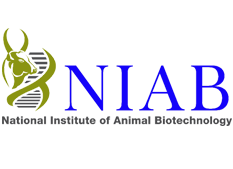Mandate
The mission of the institute is to develop a sustainable and globally competitive livestock-based economy through innovative science & technology development and promotion of entrepreneurship. NIAB aims to develop technology and solutions in animal biotechnology, leading to eventual commercialization.
Research Focus
NIAB focuses on translational research and fostering bio-entrepreneurship in the animal biotechnology sector through i) Research in the cutting edge areas of biotechnology for improving health and productivity, ii) Production of animal bioreactors to strengthen India’s role as a global player in Pharma, vaccine and enzyme production, iii) Development of high yielding livestock and poultry from indigenous and global resources, iv) Development of strategies for conservation of indigenous livestock and poultry, and v) Establishment of gene banks for genes of interest.
Human Resource
The institute currently has 20 scientists and 115 Research Fellows engaged in research and innovation efforts, supported by 10 technical staff and 06 administrative staff at the institute.
Key Scientific Achievements
Major achievements in the last 5 years (2017-22) are as follows:
Publications
PhD Degrees Awarded
Postdocs and research fellows
Patents awarded
Technologies commercialized
- Whole genome sequencing of 43 indigenous breeds of cattle and development of a high-density single nucleotide polymorphism (SNP) chip; the chip was released to the nation on August 13, 2021.
- In a flagship project on genome-assisted pathobiology, NIAB is investigating differential transcriptomes, epi-transcriptomes, and proteomes during exposure of animal and human cells to JE virus or leptospira in order to identify markers that could determine the differential pathogenicity in different hosts.
- NIAB is the coordinator of a multi-centered interdisciplinary project to set up a consortium of human and veterinary health experts to conduct nationwide surveillance of ten zoonotic and five transboundary animal diseases and to develop disease forewarning systems.
- Initiation of large multi-center collaborative programs on One Health aspects, including understanding the drivers of antimicrobial resistance in poultry meat production, elucidation of the pathobiology of Japanese encephalitis (JE) and leptospirosis.
- Conducting field-level interaction through meetings of Indian Livestock farmers and Agriculturists with NIAB scientists (MILAN) to understand regional problems in livestock rearing and to devise strategies to resolve them. Working towards the upliftment of landless and marginal farmers through the facilitation of goat rearing in an aspirational district.
- Initiation of programs on several fronts for enhancing livestock health and productivity.
- Development of tools and proof-of-concept and translational work on diagnostics for disease prevention and management.
- Initiating programs on non-germline transgenesis to produce proteins of therapeutic and commercial importance to humans and animals, such as hormones, cytokines, cell-stimulating proteins, and clotting factors.
- The researchers at NIAB have received awards and recognitions such as the Ramalingaswami Fellowship, Ramanujan Fellowship, Bob Edward Oration Award, DBT-BioCare Women Scientist Award, SERB Women Excellence Award, Prof. U. S. Srivastava Memorial Lecture Award, and several best poster/presentation awards at national conferences. A number of scientists are members of prestigious international academies and societies, as well as expert committees at various levels.
- The institute has participated in outreach and public engagement events such as seminars and talks at the India International Science Festival, Science Setu lectures, public talks by faculty, the Science Popularization program for school and college students, and National Science Day celebrations.
